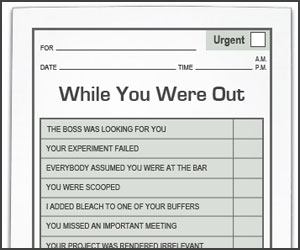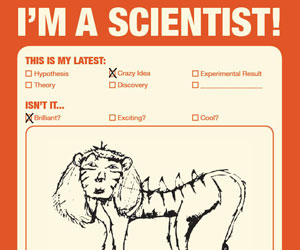 Here’s a good rule of thumb: if you can use the word “Decade” to describe your current graduate school or postdoctoral experience, it’s time to move on. In fact, our recent poll on optimizing graduate school found the ideal length to be significantly shorter than the dreaded D-word. However, grad school and postdoctoral experiences are not the same. In one situation, there are exams, committees and departments that (should) track your progress and keep you moving through the system. However, in the other situation there are far fewer administrative and departmental pressures to move on. In fact, it’s not uncommon for a postdoc to settle into a comfortable routine in which the days and weeks blend into months and years seemingly unnoticed. (Another rule of thumb: if you use the words “comfortable” and “routine” to describe your postdoc, you probably won’t be using the words “exciting new job” anytime soon.) At what point is staying in the postdoc doing more harm than good?
Here’s a good rule of thumb: if you can use the word “Decade” to describe your current graduate school or postdoctoral experience, it’s time to move on. In fact, our recent poll on optimizing graduate school found the ideal length to be significantly shorter than the dreaded D-word. However, grad school and postdoctoral experiences are not the same. In one situation, there are exams, committees and departments that (should) track your progress and keep you moving through the system. However, in the other situation there are far fewer administrative and departmental pressures to move on. In fact, it’s not uncommon for a postdoc to settle into a comfortable routine in which the days and weeks blend into months and years seemingly unnoticed. (Another rule of thumb: if you use the words “comfortable” and “routine” to describe your postdoc, you probably won’t be using the words “exciting new job” anytime soon.) At what point is staying in the postdoc doing more harm than good?
BenchLife
Being a scientist isn’t just about doing experiments, so neither are we. This is where we make breakthroughs beyond the bench for scientists.
The Ideal Postdoc Duration: Get Out Before You Get Old
by
You’re a Scientist. You’ve Got Ideas. Now You’ve Got a Notepad.
by
Optimizing Graduate School: How Long is Too Long?
by
 They say a few of the defining characteristics of a “person” are the high-level thought processes of rationality, wisdom, and self-awareness. As scientists, we should be willing to turn the microscope on ourselves and our own career path to see if a rational person would deem it wise to enter a graduate school process that can take up to a decade for some folks. Are our current educational and career development pathways truly optimized for students’ benefit, or have we let other factors slowly pull our profession out of balance?
They say a few of the defining characteristics of a “person” are the high-level thought processes of rationality, wisdom, and self-awareness. As scientists, we should be willing to turn the microscope on ourselves and our own career path to see if a rational person would deem it wise to enter a graduate school process that can take up to a decade for some folks. Are our current educational and career development pathways truly optimized for students’ benefit, or have we let other factors slowly pull our profession out of balance?
Stuck with a Bad Project (or Just a Bad Attitude)?
by
 Long before the Lady Gaga parody, graduate students and postdocs everywhere were painfully familiar with the term “bad project.” When we were sold the project everything sounded great- a huge impact in a hot field, and best of all it was only a couple of “straightforward” experiments away. We all know how this story ends.
Long before the Lady Gaga parody, graduate students and postdocs everywhere were painfully familiar with the term “bad project.” When we were sold the project everything sounded great- a huge impact in a hot field, and best of all it was only a couple of “straightforward” experiments away. We all know how this story ends.
A Quick Makeover: From ‘Lab Drab’ to ‘Ab Fab’ in 10 Minutes
by
How Long Should it Take to Get a Lab Off the Ground?
by
 Many events in life come with defined timetables. It takes 21 years to buy alcohol, four years to avenge an Olympic loss, and 11 seconds to lose your lunch if watching a Real Housewives episode. Yet in our scientific lives the time required to complete our most important milestones are undefined and arbitrary. Is five years just right for grad school, too much for postdocs and not enough for tenure decisions? Catalyzed by numerous conversations with fellow scientists, we’ve decided to examine each phase of our career development pathway to determine whether the phases are truly optimized for our success, or whether it’s time to overhaul the system.
Many events in life come with defined timetables. It takes 21 years to buy alcohol, four years to avenge an Olympic loss, and 11 seconds to lose your lunch if watching a Real Housewives episode. Yet in our scientific lives the time required to complete our most important milestones are undefined and arbitrary. Is five years just right for grad school, too much for postdocs and not enough for tenure decisions? Catalyzed by numerous conversations with fellow scientists, we’ve decided to examine each phase of our career development pathway to determine whether the phases are truly optimized for our success, or whether it’s time to overhaul the system.
BenchFly Crossword: History’s Most Famous Scientists in Two Words
by
 Distilling a lifetime’s body of work down to two words seems slightly unfair. Contemplating our own two-word biography, we hope the words “no-talent” and “ass-clown” don’t make the short list. Ironically, for history’s most accomplished scientists – many of whom started entire fields of scientific knowledge – it seems a word or two is all that’s necessary to conjure up images of their greatness. Even if “ass-clown” was an appropriate phrase for a few of these mental giants, the words “Nobel” and “Prize” usually bump it down the list. See how many of history’s most famous chemists, biologists, physicists and mathematicians you can recall with limited information.
Distilling a lifetime’s body of work down to two words seems slightly unfair. Contemplating our own two-word biography, we hope the words “no-talent” and “ass-clown” don’t make the short list. Ironically, for history’s most accomplished scientists – many of whom started entire fields of scientific knowledge – it seems a word or two is all that’s necessary to conjure up images of their greatness. Even if “ass-clown” was an appropriate phrase for a few of these mental giants, the words “Nobel” and “Prize” usually bump it down the list. See how many of history’s most famous chemists, biologists, physicists and mathematicians you can recall with limited information.
Put an End to Lab-Induced Crocodile Hands with Style
by
Throughout the day, I’m constantly taking gloves on and off. Regardless of the material (latex, nitrile), I always wash my hands after taking the gloves off because my hands either have that gross residue on them (powdered gloves) or they’re sweating (no powder). As a result, my hands are always dry and combined with winter weather, it’s unbearable. I’ve tried lotions, but then my hands feel greasy, which I hate when typing or writing in my notebook, so I end up having to wash them again- and the cycle continues… I’m guessing crocodile hands isn’t very stylish- any suggestions?
While You Were Out Notes for Scientists
by
 The lab is our workplace and in many ways it’s similar to any other job in a traditional office environment. We have a desk, a boss and a set of coworkers that on occasion can push our buttons. We even have TPS reports – although they’re more often referred to as “notebook entries” or “manuscript reviews” around the lab. However, when a co-worker steps out of the lab, an entirely different set of circumstances may ensue. Now we’re got an easy way to update the missing with the While You Were Out Notes for Scientists.
The lab is our workplace and in many ways it’s similar to any other job in a traditional office environment. We have a desk, a boss and a set of coworkers that on occasion can push our buttons. We even have TPS reports – although they’re more often referred to as “notebook entries” or “manuscript reviews” around the lab. However, when a co-worker steps out of the lab, an entirely different set of circumstances may ensue. Now we’re got an easy way to update the missing with the While You Were Out Notes for Scientists.
Group Meeting Bingo: Keeping Developmental Biologists Awake
by
 Few things are tougher than keeping your New Year’s Lab-olutions for the entire year. Being that this is just the first week back, we’re confident you were able to stay awake during this week’s seminar or group meeting. But alas, 51 weeks of challenge lie ahead and some of those weeks will be filled with seminars in a room that’s a little too warm, group meetings by a lab member that’s a little too boring, or lectures at a conference that are a little too early.
Few things are tougher than keeping your New Year’s Lab-olutions for the entire year. Being that this is just the first week back, we’re confident you were able to stay awake during this week’s seminar or group meeting. But alas, 51 weeks of challenge lie ahead and some of those weeks will be filled with seminars in a room that’s a little too warm, group meetings by a lab member that’s a little too boring, or lectures at a conference that are a little too early.




